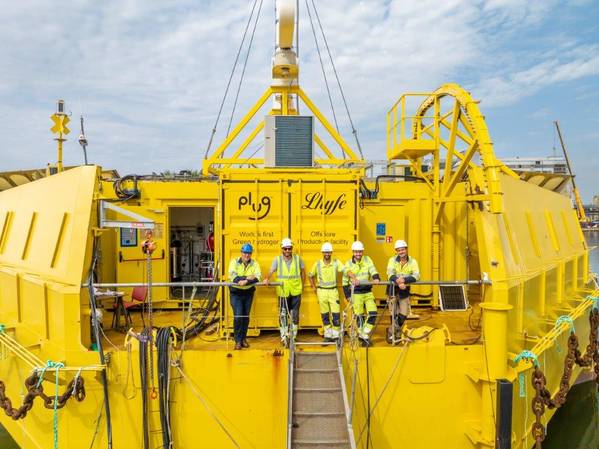
France-based clean hydrogen producer Lhyfe has launched the world’s first offshore renewable green hydrogen production demonstrator.
The pilot was launched yesterday (September 22) in Saint-Nazaire, France, which will now begin an 18-month wind-powered pilot, as part its drive towards large-scale carbon reduction.
It involves Lhyfe's new Sealhyfe 400 kg/day (1MW equivalent) green hydrogen producing electrolyser platform, which has been installed on the WAVEGEM wave energy platform developed by Geps Techno.
This will be operated near the quayside in Saint-Nazaire before being taken 20km off the coast of Le Croisic to the offshore testing site (SEM-REV) operated by French engineering school Centrale Nantes. There, it will be supplied with electricity from a floating offshore wind turbine, installed in 2018.
The launch comes after Lhyfe began its first UK operation in North East England to identify opportunities to deploy production facilities to support the country’s net zero ambitions.
Colin Brown, UK and Ireland country manager of Lhyfe, said the new “Sealhyfe” platform was a major step towards unlocking the huge potential of offshore wind.
Sealhyfe will operate at the quayside and then off the coast of Le Croisic, on the offshore testing site (SEM-REV) operated by French engineering school Centrale Nantes.
Lhyfe says it is convinced that offshore has a central role to play in bringing renewable green hydrogen production to mass market. Producing hydrogen using offshore wind turbines could allow all coastal countries to develop green solutions for regions, industry, transport and fuel distribution, it says. However, until now, no one has ever produced renewable green hydrogen at sea.
In 2021, Lhyfe, inaugurated what it says was the world’s first plant supplying renewable green hydrogen produced using wind power to customers in western France.
The Sealhyfe project aims to prove that is now possible to produce the clean energy source offshore.
It will have to meet several major and unprecedented challenges, including:
•Performing all stages of hydrogen production at sea, i.e. converting the electrical voltage from the floating wind turbine, pumping, desalinating and purifying seawater, and breaking the water molecules via electrolysis to obtain renewable green hydrogen;
•Managing the effects on the system of the platform’s motion: list, accelerations, swinging movements, etc.;
•Enduring environmental stress: Sealhyfe will have to survive the premature ageing of its parts (corrosion, impacts, temperature variations, etc.);
•Operating in an isolated environment: the platform must operate fully automatically, without the physical intervention of an operator, except for scheduled maintenance periods which have been optimally integrated from the design phase.
The electrolyser was supplied and optimised for these exceptional operating conditions by Plug Power, one of the market leaders that is strongly engaged in the offshore route. Together, Plug and Lhyfe have developed the first electrolyser capable of operating on a floating platform.
The project also benefited from the expertise of French offshore and marine renewable energy players including Chantiers de L'Atlantique,Geps Techno and Eiffage Energie Systemes, for the system’s integration on a platform and the naval architecture of the latter, specifically for the particularly stormy sea conditions of the site, the Port of Saint-Nazaire, facilitator of Sealhyfe’s assembly and testing, and, Kraken Subsea Solutions, which participated in the design of the underwater electrical connection to the renewable marine energies produced on the SEM-REV platform.
A first six-month trial phase is being started at quay, in the port of Saint-Nazaire, to obtain initial reference measurements and test all of the systems (desalination and cooling systems, stack behaviour, remote control, energy management, resistance to environmental conditions, etc.).
At the end of this first stage, Sealhyfe will spend a period of 12 months off the Atlantic coast. It will be installed less than a kilometer from the floating wind turbine, fixed to the ground by a system of anchors and connected to the site’s underwater hub using an umbilical designed and dedicated for this application (energy and data transfer).
At the end of this trial, Lhyfe will have a substantial volume of data, which should allow it to design mature offshore production systems, and to deploy robust and proven technologies on a large scale, in keeping with the EU’s objective to produce 10 million tonnes a year of renewable hydrogen by 2030.
By 2030-2035, offshore could represent an additional installed capacity of around 3 GW for Lhyfe.
Sealhyfe has had support from the French energy and environment agency ADEME and the Pays de la Loire Region.
Matthieu Guesné, CEO and founder of Lhyfe, said: “By paving the way for the mass production of renewable hydrogen at sea, Sealhyfe is fully in line with the EU’s strategy to deploy an offshore hydrogen chain, and wishes to help build the energy sovereignty of countries. The acceleration of the development of offshore wind plants announced by the President of the French Republic will strongly contribute to the deployment of Lhyfe on its offshore strategy.”
Colin Brown, UK and Ireland country manager of Lhyfe, said: “Renewable green hydrogen production at scale is one of the key solutions to help the UK reach its net zero targets. “Offshore electrolysis can help unlock the huge potential of offshore wind around the UK.
“Sealhfye is a major step forward in demonstrating its availability today and Lyhfe’s ambition to help the UK’s transition to a clean, low-carbon future. We are exploring exciting opportunities across the UK to enable local decarbonisation. We encourage any UK industry or organisation seeking to decarbonise to get in touch with us.”



